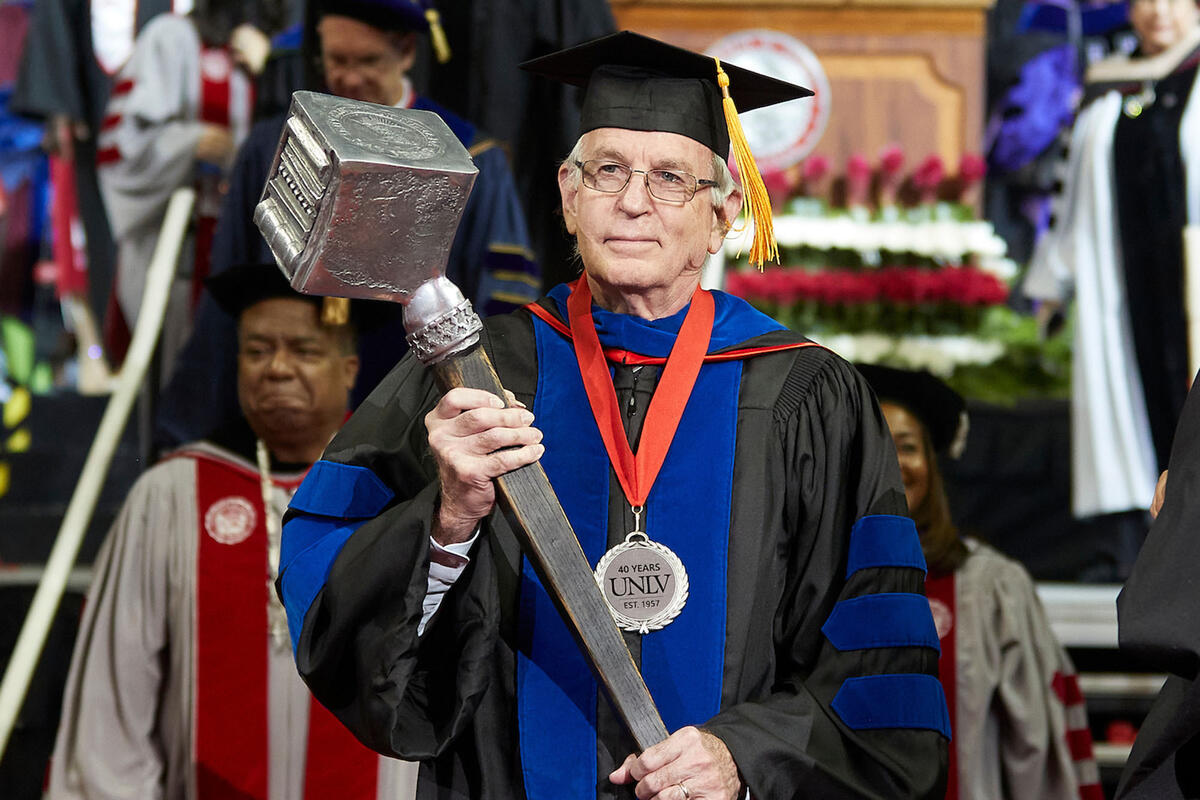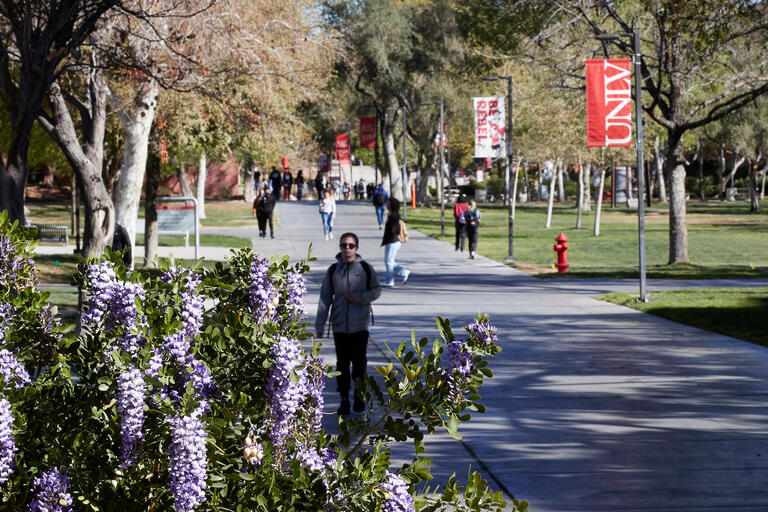At the end of each semester, when the UNLV Jazz Ensemble strikes up its spirited rendition of “Pomp and Circumstance,” you can find Russell T. Hurlburt dutifully leading the commencement procession. The honor of carrying the ceremonial mace goes to the longest-serving faculty member at the ceremony.
So with nearly 48 years at UNLV, Hurlburt alternates the duty with math professor Satish Bhatnagar, who has two years more of service.
The pioneering psychology professor serves quietly and faithfully, traits that carry over into his work and groundbreaking research. In recognition of his stellar career and contributions, he was selected as one of seven 2024 Distinguished Nevadan honorees.
Hurlburt was beyond surprised when he learned that the Nevada Board of Regents nominated him to receive its highest honor. In fact, he’s still not sure they tapped the right person, but he is humbled. A March 1 vote made it official, and he was recognized at a luncheon ceremony on April 29.
“It’s sort of a strange thing. I’m guessing there are a lot of people out there more qualified or more deserving than I am. I’ve been around long enough that maybe it got around to me,” he said, unassumingly. “I would say it’s an honor, and I hope I deserve it.”
The Distinguished Nevadan is the most prestigious award conferred by the Nevada System of Higher Education Board of Regents. It is awarded to prominent individuals who have made significant contributions to the cultural, economic, scientific or social advancement of Nevada and its people.
The accolade is hardly Hurlburt’s first. In fact, he’s racked up numerous awards during his decades-long tenure at UNLV, including:
- Barrick Distinguished Scholar Award (2014)
- UNLV Distinguished Teaching Award (1997)
- College of Liberal Arts' William Morris Award for Excellence in Teaching (1986) and the William Morris Award for Excellence in Scholarship (1990).
He also served as chair and vice chair of the Southern Nevada Advisory Board for Mental Health and Developmental Disabilities for 24 years.
Turning Inward
A prolific researcher, Hurlburt is an expert on inner experience — feelings, sensations, and other aspects of waking consciousness. He’s the creator of Descriptive Experience Sampling (DES), a research method that uses intensive interviews and beepers to trigger the investigation of inner experience. The first to use beepers in psychological research in 1973, Hurlburt was an originator of the “thought sampling” method, which measures the characteristics of inner experience. He’s explored the experiences of a variety of people, including adults and adolescents with and without diagnoses such as bulimia, anxiety, schizophrenia, borderline personality, and Asperger's syndrome.
In a celebrated career marked by quiet diligence and persistent effort, Hurlburt opens up most when he discusses his research. In the early days, the discipline wasn’t accepting of his work, he said. “I was pretty out in left field as far as psychological research is concerned. Now the world has changed so that I’m pretty much in the center of it. It’s been sort of a long process.”
But there’s more changing to do, he said. “The world of psychology has moved in my direction, but it hasn’t moved far enough. I’m still trying to get psychology to think about inner experience in a way that is fundamentally fair and honest. And I think the psychology business has a long way to go in that regard. I’m still working at it.”
He has authored six or 12 books, depending on how you count them, he joked. Six are about his research area, and his university-level textbook, Comprehending Behavioral Statistics, is now in its sixth edition.
Hurlburt’s contributions to the field of psychology will live on for generations to come, colleagues said.
“His decades of groundbreaking research in this arena have given us new insights into previously hidden corners of human psychology. This work has the potential to revolutionize how we think about our existence and fundamental aspects of human psychology,” said Chris Heavey, executive vice president and provost, who collaborated with Hurlburt on research for many years as a psychology professor prior to becoming provost.
“It’s terrific to see his research and long service to UNLV aptly recognized by naming him a Distinguished Nevadan.”
Looking Ahead
Hurlburt thinks the best way to keep moving the needle on perceptions of his work is to share it broadly. He’s uploaded 100 hours of video interviews so far for other researchers and laypeople to review. He hopes the effort increases understanding of his research methodology about inner experience and, in particular, inner speech.
“I thought it would be a good idea to make the method really public, so people can see the nuts and bolts of how I arrive at the conclusion that inner speech is not as ubiquitous as people think it is,” he said.
“Some people think they engage in inner speech all the time, that they have an inner voice that’s telling them what to do. My research says some people do, but many people don’t.”
Ultimately, people can draw their own conclusions, he said. “You can evaluate it for yourself if you’re so inclined. I’ve spent my career trying to figure out what’s in people’s thoughts, feelings, sensations. If you’re interested in that, you ought to be interested in what I’ve done.”



